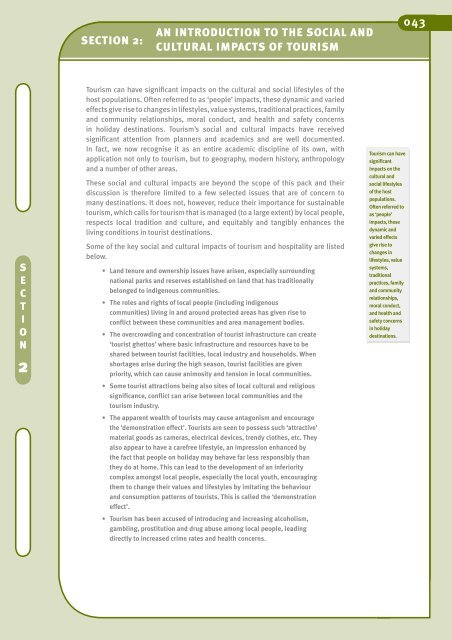Online version: PDF - DTIE
Online version: PDF - DTIE
Online version: PDF - DTIE
Create successful ePaper yourself
Turn your PDF publications into a flip-book with our unique Google optimized e-Paper software.
SECTION 2:<br />
AN INTRODUCTION TO THE SOCIAL AND<br />
CULTURAL IMPACTS OF TOURISM<br />
043<br />
S<br />
E<br />
C<br />
T<br />
I<br />
O<br />
N<br />
2<br />
Tourism can have significant impacts on the cultural and social lifestyles of the<br />
host populations. Often referred to as ‘people’ impacts, these dynamic and varied<br />
effects give rise to changes in lifestyles, value systems, traditional practices, family<br />
and community relationships, moral conduct, and health and safety concerns<br />
in holiday destinations. Tourism’s social and cultural impacts have received<br />
significant attention from planners and academics and are well documented.<br />
In fact, we now recognise it as an entire academic discipline of its own, with<br />
application not only to tourism, but to geography, modern history, anthropology<br />
and a number of other areas.<br />
These social and cultural impacts are beyond the scope of this pack and their<br />
discussion is therefore limited to a few selected issues that are of concern to<br />
many destinations. It does not, however, reduce their importance for sustainable<br />
tourism, which calls for tourism that is managed (to a large extent) by local people,<br />
respects local tradition and culture, and equitably and tangibly enhances the<br />
living conditions in tourist destinations.<br />
Some of the key social and cultural impacts of tourism and hospitality are listed<br />
below.<br />
• Land tenure and ownership issues have arisen, especially surrounding<br />
national parks and reserves established on land that has traditionally<br />
belonged to indigenous communities.<br />
• The roles and rights of local people (including indigenous<br />
communities) living in and around protected areas has given rise to<br />
conflict between these communities and area management bodies.<br />
• The overcrowding and concentration of tourist infrastructure can create<br />
‘tourist ghettos’ where basic infrastructure and resources have to be<br />
shared between tourist facilities, local industry and households. When<br />
shortages arise during the high season, tourist facilities are given<br />
priority, which can cause animosity and tension in local communities.<br />
• Some tourist attractions being also sites of local cultural and religious<br />
significance, conflict can arise between local communities and the<br />
tourism industry.<br />
• The apparent wealth of tourists may cause antagonism and encourage<br />
the ‘demonstration effect’. Tourists are seen to possess such ‘attractive’<br />
material goods as cameras, electrical devices, trendy clothes, etc. They<br />
also appear to have a carefree lifestyle, an impression enhanced by<br />
the fact that people on holiday may behave far less responsibly than<br />
they do at home. This can lead to the development of an inferiority<br />
complex amongst local people, especially the local youth, encouraging<br />
them to change their values and lifestyles by imitating the behaviour<br />
and consumption patterns of tourists. This is called the ‘demonstration<br />
effect’.<br />
• Tourism has been accused of introducing and increasing alcoholism,<br />
gambling, prostitution and drug abuse among local people, leading<br />
directly to increased crime rates and health concerns.<br />
Tourism can have<br />
significant<br />
impacts on the<br />
cultural and<br />
social lifestyles<br />
of the host<br />
populations.<br />
Often referred to<br />
as ‘people’<br />
impacts, these<br />
dynamic and<br />
varied effects<br />
give rise to<br />
changes in<br />
lifestyles, value<br />
systems,<br />
traditional<br />
practices, family<br />
and community<br />
relationships,<br />
moral conduct,<br />
and health and<br />
safety concerns<br />
in holiday<br />
destinations.
















